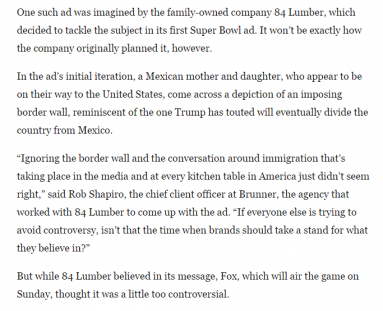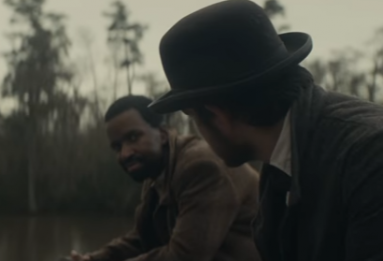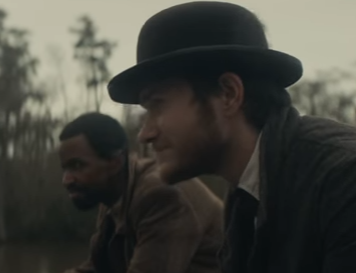The right-wing backlash against this Budweiser commercial is the best praise you can give it, like when Fox News described “No Fascist US” as “anti-Trump graffiti.” The ad is a ludicrous load of ideology, but if it makes Trumpsters angry, then, frankly, it has already exhausted the revolutionary potential of a Super Bowl beer commercial. That Budweiser has denied any political intent (“There's really no correlation with anything else that's happening in the country”) is the icing on the cake; it’s corporate PR, but it’s also, accidentally, a hilarious bit of gaslighting, droll trollery.
“Correlation” is a carefully chosen word, a synonym for “not causation.” But context is not optional and there is no such thing as coincidence in film. As any good communist film theorist knows, the true kernel of film is the cut—the place where the decision to edit turns the jump from one thing to another into a conjunction, a relationship, an argument, and a story—and so the “cut” between what’s happening in the country and almost any bit of text we might come across is what makes “No Fascist US” into anti-Trump graffiti, and what makes this almost offensively inoffensive story about white immigration into an anti-Trump message. If a film director cuts from a daisy to a mushroom cloud, that cut tells a story about the relationship between those two things. In the reality show that America now is, to cut from Trump’s Muslim ban to a Budweiser commercial is to place the two in relation, and this is what this commercial has done.
Anyway, the commercial: over the course of a tightly-compressed one-minute montage, we see a grim-faced white man immigrate to America. We see his ocean-going vessel buffeted by waves and, on shore, we see him pushed and shoved and told he isn’t wanted; we see him exchange glances with a black man as they ride a steam-boat into the future—a moment of camaraderie, recognition, the natural solidarity of the oppressed outsider, a sly Huckleberry Finn reference—and though the steamboat catches fire and burns, he continues on, undaunted, to the promised land, St. Louis.
No politics here! Unlike, say, the 84 Lumber ad that Fox censored for its politics:

As Soviet film theorists figured out—when they were trying to reverse-engineer Hollywood’s incredibly successful capitalist propaganda machine—the trick was (among other things) to hide the ideology in the gaps, implied, to make sure it didn’t feel like propaganda (which the 84 Lumber ad obviously does). If you know you are being made to feel, you will resist; ideology is transmitted when you feel more than you know. The 84 Lumber ad is completely and obviously on the nose; it is so obviously about the wall that, when you say it, gets audibly capitalized and proper-nouned as The Wall.
But let us cut from Lumber 84 to Budweiser: why does an “ad” about Mexican immigrants scan as political, while the Budweiser commercial has plausible deniability, and can pretend to be just the meet-cute origin story of a brand’s patriarchal bros? Busch actually came with money, married Anheuser’s daughter, and used his inheritance to get into the beer business, but while that compression doesn’t scan as ideological, the ideology is exactly what was cut: beer as a marker of immigrant dissolution—a German and Irish lack of good protestant work ethic, for example—and the ethnic separatism that would make a pair of Germans in St. Louis more likely to form a business partnership with each other (and cement it with family ties) than with anyone else. And because there are no brown people on screen, it can’t be about politics, can it? (The phrase "You don't look like you're from around here" is where we know that this commercial is not really about what it’s about: he does look like he’s from around there after all, being white).
The core of the commercial, for me, is the series of cuts that place a white immigrant from Germany in relationship to a black man in St. Louis, in 1857, a few years before the civil war.


A black man on a steam boat in 1857, in the south, would either be enslaved or living in the shadow of racialized slavery
[Narrator: “They didn’t and weren't.”]